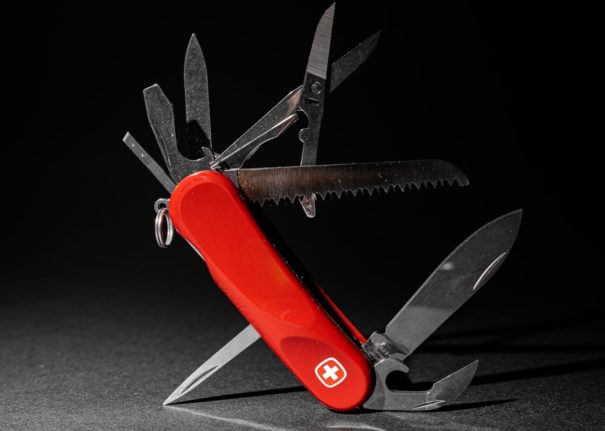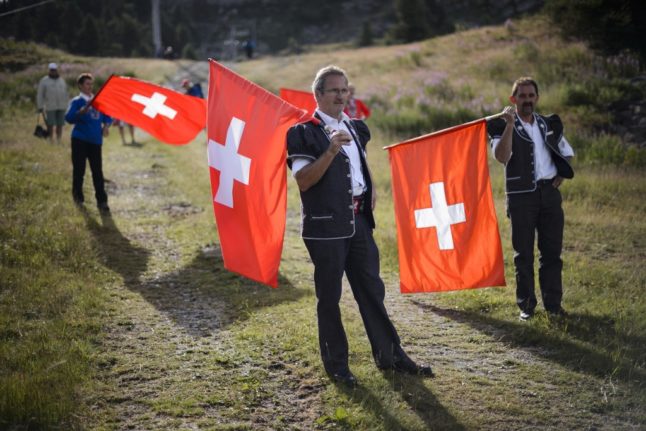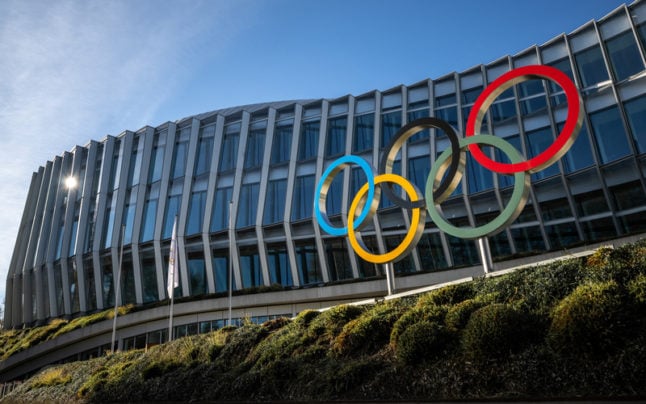If you ask people what images they conjure up when they hear the word ‘Switzerland’, they will probably recite, though maybe not in that order, cheese, chocolate, watches, cows, and yodelling.
All that is true, though some of the cheeses and chocolates have recently lost their innate ‘Swissness’ .
READ ALSO: Cuckoo clocks and Toblerone: The ‘Swiss’ products that are not actually Swiss
But beyond those stereotypes, you will also find other things that are likely to surprise you — either because you didn’t know they existed, or because you didn’t know they were Swiss.
For instance:
Swiss cows have names
Not only do Swiss authorities know how many cows there are in the country (1,5 million in December 2022), but — just like for human residents — they also know their names.
Some 4,422 Swiss cows are currently called Bella (the most popular bovine name), according to the Agricultural Information Service LID.
The second place in the ranking (3,327 cows) is occupied by Fiona, followed by Bianca in the third position (3,120 cows).
However, this being Switzerland, regional differences appear: while Bella is number one in German and French-speaking parts of the country, Luna is in the first place in the Italian-speaking canton of Ticino.
Runners-up are Sina in Swiss-German parts, and Tulipe and Etoile in French-language areas.
Commit these names to memory, as you may have to recite them during a naturalisation interview. Not knowing this essential piece of information may be taken to mean you are not sufficiently integrated. (Better yet, to impress your local naturalisation committee, learn the names of cows in your village).

Switzerland is full of nuclear shelters
Yes, the country is neutral, and no, it has not been attacked by a foreign power since Napoleon came to call in 1798 — the last time Switzerland took part in a war.
It even managed to stay out of World War II.
So it is an obvious paradox that the country has enough fallout shelters to protect its entire population.
And they are well prepared to do so: These shelters, whether located in private homes (built before 1980) or communal facilities, have a reinforced steel door, ventilation system, anti-gas filter, and enough shelves to stock a two-week supply of water, medications, and non-perishable food.
Put it down to Swiss pragmatism and a penchant for meticulous planning: the Swiss don’t like to leave anything to chance and prepare for all kinds of scenarios, whether plausible or not.
While the war in Ukraine had briefly revived interest in these bunkers, they have never been used in a national emergency. They have, however, served other purposes over the years: to make sure this extra space doesn’t go to waste, many Swiss households used it as a storage space for wines, ski equipment, and other objects.
READ ALSO: What are Switzerland’s nuclear bunkers and does each home need one?
The picturesque scenery is booby-trapped
This may also be incomprehensible to foreigners, given the country’s peaceful existence and lack of enemies, but all tunnels, bridges and viaducts located at entry points to Switzerland are rigged with explosives so they can be quickly demolished .
This system was originally meant to be deployed if Germans ever attacked Switzerland, and then kept during the Cold War years.
While the explosives in many of the structures have been deactivated in recent decades, some still reportedly remain.
However, you should not be concerned about this; no accidental explosions of this type have happened in Switzerland, and besides, there are all these fallout shelters just in case.
You can’t boil a live lobster
In 2018 Switzerland passed a law making it illegal to boil a live lobster, deeming this practice cruel, as lobsters apparently feel pain.
Instead, this legislation, the first of its kind in the world, calls for a more humane death by “rendering lobsters unconscious” before tossing them into scalding water.
There are no clear instructions on how to render the lobster unconscious, but apparently hitting its head with a hammer or electrocuting it is less painful than hot water.
Swiss soldiers actually do use army knives
In the early days, the iconic knife’s primary purpose was to help troops perform basic tasks such as cutting string and wires, opening a can of food, as well as assembling and disassembling their service rifles.
To this day, each new recruit receives a basic ‘Soldier’ knife at the beginning of their service. This particular model features a can opener, screwdriver, blade, wood saw, cap lifter, wire stripper, reamer, and key ring — all the accoutrements needed to defend Switzerland.
READ ALSO: Do Swiss soldiers really use the army knife?

Kids with guns (yes, it is totally normal)
Probably just as much as they like their army knives, the Swiss are also fond of guns.
And that includes kids as well.
In fact, each September sounds of gunfire can be heard around Zurich.
There is nothing alarming about it though: it’s just a bunch of teenagers doing what comes naturally to many Swiss youngsters: sharpshooting.
In this case, the 12- to 16-year-olds are participating in Knabenschiessen, the world’s largest youth rifle competition.
Many Swiss learn to shoot from an early age, which is not seen as anything strange or dangerous because while they do so, they also develop a sense of responsibility toward their firearms, which is seen as a desirable quality for young people.
Cows get flown by helicopters
Well, why not?
Last year, social media was abuzz with photos of airlifted Swiss cows, with an explanation that they are taken to highlands by helicopters for grazing during summers and are brought down back again the same way in the winters.
A cow is transported by helicopter after its summer sojourn in the high Swiss Alpine meadows near Klausenpass, Switzerland. 📷 Arnd Wiegmann
More of our 2021 pictures of the year: https://t.co/msLJ6IA4uX pic.twitter.com/2wzhBMQijh
— Reuters Pictures (@reuterspictures) December 21, 2021
This particularly concerns injured cows that cannot make the up or down journey. Instead, they are flown to the area where the rest of the herd will join them.
It doesn’t matter whether it’s Bella, Fiona, Bianca, or Luna — they will all be taken for a ride.



 Please whitelist us to continue reading.
Please whitelist us to continue reading.
Member comments